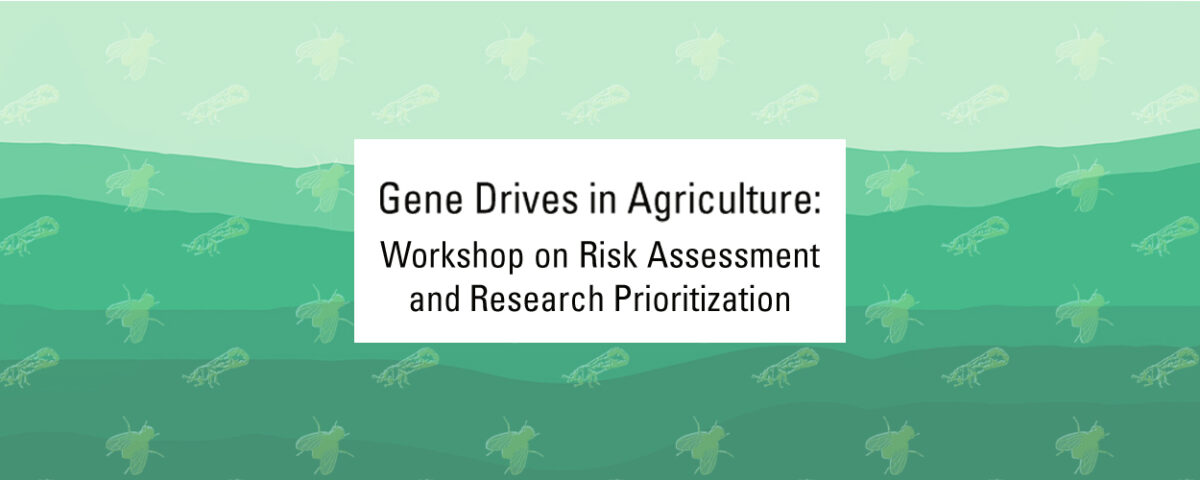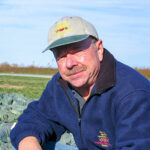Gene Drives in Agriculture:
Risk Assessment and Research Prioritization
June 2, 3, & 17, 2022 via Zoom | USDA-NIFA Funded Workshop
Plant pests such as the spotted-wing drosophila (Drosophila suzukii) fruit flies are responsible for billions of dollars of crop losses worldwide. As such, the NASEM’s 2016 report Gene Drives on the Horizon recommends continued research into the potential benefits and risks of developing gene drive technologies to address the problem.
The Gene Drives in Agriculture workshop featured seven speakers on various aspects of risk assessment in the context of gene drives for agricultural pests. The purpose of the workshop was to foster deliberative discussions among participants, resulting in the production of a white paper on research priorities for these technologies.
This workshop was hosted by the Genetic Engineering and Society (GES) Center at NC State University and funded by the USDA-NIFA Biotechnology Risk Assessment Grant program (grant number 2020-33522-32269).
Workshop Report
Download: Gene Drives in Agriculture: Risk Assessment and Research Prioritization
Published: December 2022, online at https://go.ncsu.edu/ges-gene-drive-workshop-white-paper
Authors: Jabeen Ahmad, Jennifer Baltzegar, Zachary Brown, Jason Delborne, Sumit Dhole, Johanna Elsensohn, Fred Gould, Khara Grieger, Andrew Hardwick, Jennifer Kuzma, Marce Lorenzen, Nick Loschin, Raul Medina, Bethany Mostert, Patti Mulligan, Kim Pepin, Dylan Spangle, Sharon Stauffer, Ruthie Stokes, Willy Wei, and Katie Barnhill-Dilling.
Participant Resources
Access to resource files for registered workshop participants and speakers, including speaker abstracts and articles
Gene Drive Workshop Resource PortalNeed help?
Registered for the workshop with a non Gmail/Google-based email address and having trouble accessing the workshop resource portal? Please complete this form.
Speakers
Featured speakers for the Gene Drives in Agriculture workshop.
Workshop Organizers
- Dr. Katie Barnhill-Dilling (PI), Senior Research Scholar at the GES Center, NC State
- Dr. Khara Grieger (Co-PI), Assistant Professor in Environmental Health and Risk Assessment at NC State
- Dr. Jennifer Kuzma (Co-PI), Goodnight-NC GSK Foundation Distinguished Professor in the Social Sciences, Co-Director of the GES Center, NC State
- Dr. Jason Delborne (Co-PI), Professor of Forestry and Environmental Resources and Director of Science, Technology, and Society at NC State
- Dr. Danesha Seth Carley (Co-PI), Director of the NSF Center for Integrated Pest Management, and Director of the Center of Excellence for Regulatory Science in Agriculture (CERSA) at NC State
- Dr. Zack Brown (Co-PI), Associate Professor of Agricultural and Resource Economics at NC State
- Patti Mulligan, Communications Director at the GES Center, NC State
- Sharon Stauffer, Center Program Manager at the GES Center, NC State
- Ilaria Cimadori, PhD Student in Environmental and Animal Law at Yale School of the Environment
- Nick Loschin, PhD Student in Biology and AgBioFEWS Fellow at NC State
- Sihui Ni, PhD Student in Horticultural Science at NC State
Related Publications
- Kokotovich, A.E., Barnhill-Dilling, S.K., Elsensohn, J.E., Li, R., Delborne, J.A., Burrack, H. Stakeholder engagement to inform the risk assessment and governance of gene drive technology to manage spotted-wing drosophila. Journal of Environmental Management (2022). doi: 10.1016/j.jenvman.2022.114480. Download
- Kanya C. Long, Luke Alphey, George J. Annas, Cinnamon S. Bloss, Karl J. Campbell, George M. Church, James P. Collins, Kimberly L. Cooper, Jason A. Delborne, Kevin Esvelt, Sam Weiss Evans, Fred Gould, Sarah Hartley, Jennifer Kuzma, Marce Lorenzen, Jeantine E. Lunshof, Megan J. Palmer, J. Royden Saah, Maxwell J. Scott, et. al. 2020. Core commitments for field trials of gene drive organisms. Science, 18 Dec 2020, Vol. 370, Issue 6523, pp. 1417-1419. doi: 10.1126/science.abd1908 Download
- Kuzma, J. (2020). Engineered Gene Drives: Ecological, Environmental, and Societal Concerns. In: Chaurasia, A., Hawksworth, D.L., Pessoa de Miranda, M. (eds) GMOs. Topics in Biodiversity and Conservation, vol 19. Springer, Cham. doi: 10.1007/978-3-030-53183-6_17
- Dalton R. George, Todd Kuiken, and Jason A. Delborne. Articulating ‘free, prior and informed consent’ (FPIC) for engineered gene drives. Proc. Royal Soc. B. Vol. 286, Issue 1917. Published: 18 December 2019. doi: 10.1098/rspb.2019.1484
- Gregory A Backus, Jason A Delborne. Threshold-Dependent Gene Drives in the Wild: Spread, Controllability, and Ecological Uncertainty. BioScience, biz098, doi: 10.1093/biosci/biz098. Published: 18 September 2019. Download
- Michael S. Jones, Jason. A. Delborne, Johanna Elsensohn, Paul D. Mitchell, Zachary S. Brown. Does the U.S. public support using gene drives in agriculture? And what do they want to know?. Science Advances 11 Sep 2019; Vol. 5, no. 9, eaau8462. doi: 10.1126/sciadv.aau8462. Download
- Jennifer Kuzma (2019). Procedurally Robust Risk Assessment Framework for Novel Genetically Engineered Organisms and Gene Drives. Regulation and Governance doi: 10.1111/rego.12245. Download
- Dominique Brossard, Pam Belluck, Fred Gould, Christopher D. Wirz. Promises and Perils of Gene Drives: Navigating the Communication of Complex, Post-Normal Science Proceedings of the National Academies of Sciences. doi: 10.1073/pnas.1805874115 Download
- Jason Delborne, Jennifer Kuzma, Fred Gould, Emma Frow, Caroline Leitschuh and Jayce Sudweeks. 2018. Mapping research and governance needs for gene drives. Journal of Responsible Innovation. Vol. 5, Iss. sup1, 2018. doi: 10.1080/23299460.2017.1419413. Introduction to Special Issue: Roadmap to Gene Drives: Research and Governance Needs in Social, Political, and Ecological Context. Download
- J. Kuzma, F. Gould, Z. Brown, J. Collins, J. Delborne, E. Frow, K. Esvelt, D. Guston, C. Leitschuh, K. Oye and S. Stauffer. 2017. A roadmap for gene drives: using institutional analysis and development to frame research needs and governance in a systems context. Journal of Responsible Innovation. Vol. 5, Iss. sup1, 2018. doi: 10.1080/23299460.2017.1410344. [Special Issue: Roadmap to Gene Drives: Research and Governance Needs in Social, Political, and Ecological Context. Download
- Jennifer Baltzegar, Jessica Cavin Barnes, Johanna E. Elsensohn, Nicole Gutzmann, Michael S. Jones, Sheron King, and Jayce Sudweeks. 2017. Anticipating complexity in the deployment of gene drive insects in agriculture. Journal of Responsible Innovation. Vol. 5, Iss. sup1, 2018. doi: 10.1080/23299460.2017.1407910. Download
- Gene Drives on the Horizon: Advancing Science, Navigating Uncertainty, and Aligning Research with Public Values. Washington, DC: The National Academies Press. [Jason Delborne, committee member]. doi: 10.17226/23405. Download






